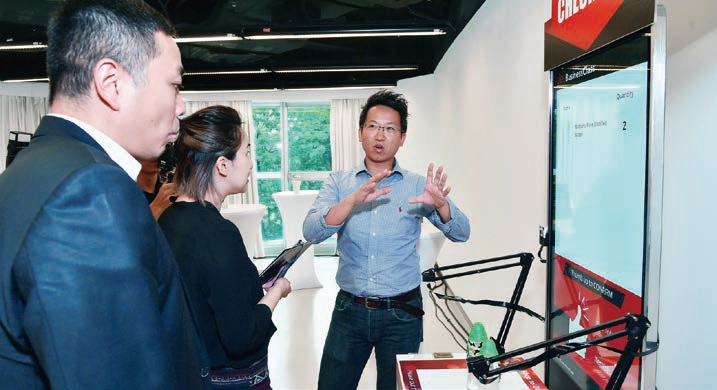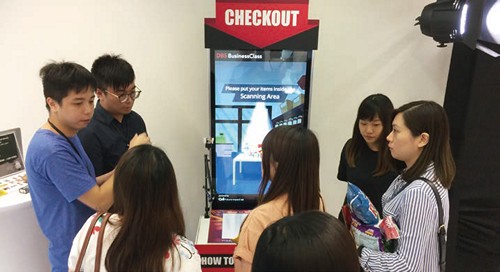Unmanned stores, which disrupt the traditional retail business model and customer shopping experience to drive new retail business opportunities, are currently the most widely discussed “unmanned economy” topic around the world.
Ernest Lo: Accumulate Experience and Data to Lay a Solid Foundation of Unmanned Stores
Amazon Go, Amazon’s checkout-free store, shook the market when it was launched in 2016; Tao Cafe, Alibaba’s staff-less store, was unveiled in 2017, indicating that unmanned stores are blooming. However, technology giants are not the only ones capable of developing relevant technologies. The local startup Future Impact Lab, at the invitation of DBS Bank, earlier showcased its self-developed system at DBS Business Class Retailers Disrupt, a new retail-themed event.
Ernest Lo, Founder of Future Impact Lab, looks forward to collecting user opinions through relevant programmes to understand the practical application issues associated with unmanned stores. He mentioned that the system he presented takes out the experience part of the retail process. The customer simply places the items one by one at the checkout counter and the cameras on both sides automatically enter the payment list after image analysis. After confirming that the data are correct, the customer raises a thumb at the camera to complete the transaction.

New technologies support new retail concepts
Lo pointed out that there are currently two main technologies for unmanned stores: Amazon Go uses video cameras supplemented by AI analysis, while the unmanned stores of Alibaba and Hong Kong’s Watson put radio frequency identification (RFID) tags on each item. “They are two extremes. Amazon Go has a lot of cameras to keep track of the customer’s selection process and are able to accurately identify a variety of goods, while helping the store improve the shopping process, but it is technically demanding and costly. On the other hand, the use of RFID tags can also correctly identify the items and is relatively low cost.” However, he stressed that the new retail concept emphasises the customer’s entire shopping experience, not just the payment process, but also the subsequent loyalty programme, membership database, etc., which RFIDs cannot support.
The system developed by Lo’s team has broken through the above two models. It combines AI and cameras to enable not only offline operation, but also provide data collection and analysis at a low cost. Since this system neither requires largescale computing nor connection to the Internet, it can even be used in traditional shopping malls where signal reception is poor. In fact, Lo’s team has spent a lot of time perfecting the system. During the exhibition, the system showed 90% accuracy in identifying the items. Some customers even said that it was faster than Alibaba’s system, which gave the team a great sense of encouragement.
Security and privacy cannot be overlooked
 Lo admitted that many people are indeed not keen in shopping at unmanned stores, as they are mainly concerned about security and safety issues, “with so many cameras in the store, customers are worried about the security of personal data, e.g. whether it is safe to link personal data to the systems of Mainland suppliers. This will even affect processes such as warehousing, logistics and delivery.”
Lo admitted that many people are indeed not keen in shopping at unmanned stores, as they are mainly concerned about security and safety issues, “with so many cameras in the store, customers are worried about the security of personal data, e.g. whether it is safe to link personal data to the systems of Mainland suppliers. This will even affect processes such as warehousing, logistics and delivery.”
In Lo’s view, there is a dearth of an unmanned store solution providers in Hong Kong. Relevant operators usually focus on system and technical issues, often ignoring user experience, but user experience is precisely the most important part determining the success of the new retail model. However, he believes that although Hong Kong currently lacks practical application experience in the development of unmanned stores, it is making progress gradually. At the current stage, it should acquire practical application experience and gather user opinions and data.
Unmanned economy is not all
Lo was inspired while developing the unmanned store system; he said “unmanned stores offer many possibilities. Is the unmanned concept applicable in other industries? If there is a chronic shortage of public health care staff, can the concept of unmanned stores be applied to doctor consultation? But from another perspective, as some people prefer interaction, is the unmanned concept the best solution?” Lo said that in the era of unmanned economy, it is better to think about and study how to respond to the needs and demands of different people.




